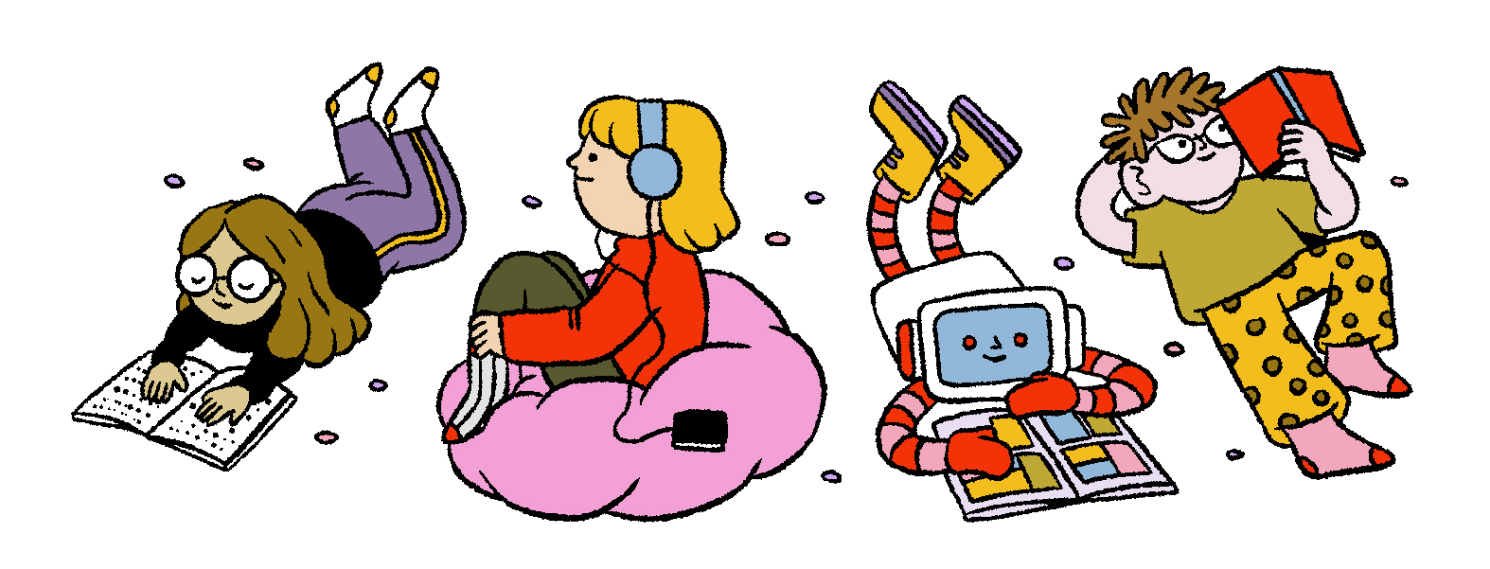Accessibility
A Club For Kids Of All Abilities!
The TD Summer Reading Club is a program designed for all kids, including kids who have disabilities. The club has made a commitment to create online experiences, as well as printed notebooks, with accessibility in mind. You can feel reassured that your child will receive a warm welcome at your local library because library staff have access to the training and resources that will help them create safe and inclusive spaces for your child.

How is the program accessible?
The program’s online and print elements have been designed according to accessibility standards so children with different disabilities or who use assistive technology can participate in this summer’s fun!
Website - built following accessibility standards to accommodate users with disabilities.
Notebooks - feature larger fonts and more white space to help kids focus on the words and pictures so they can read, write and draw! Kids will receive a notebook when they register at the library.
Web comic - includes an audio version of the story so kids can listen to it or hear the story as they read the words.
Videos - include captioning that displays the words of the text while the person is speaking.
StoryWalk® panels – your library may feature a StoryWalk where each page of a picture book is displayed on large panels, and you walk along to the next panel to read the next page. These panels include QR codes which read aloud the text. Just use your cell phone’s camera to scan the code to hear the story.
Accessible format notebooks - audio, braille, large print and OpenDyslexic font versions of the notebooks are freely available: Accessible format notebooks
Books!
Does your child find it easier to read audiobooks, ebooks or in braille? Several of the titles on the Recommended Reads list are available in one or more of these formats, or there may be other titles related to summer fun that kids may enjoy. Here are two ways to find summer reading books in accessible formats:
- Through your library. Libraries often have huge collections of audio and ebooks that you can read using a computer or app. Specialized reading tools can read aloud the text on the screen, allow you to enlarge the text size or line spacing, or have other supports to help your child decode and understand the words.
- Through CELA or NNELS. If your child has a print disability, meaning they cannot read printed words due to a learning or visual disability, or a physical disability where they can’t hold or turn the pages of a book, they may access free books in audio, braille or accessible text through the Centre for Equitable Library Access (CELA) and/or the National Network for Equitable Library Service (NNELS). Ask library staff about which of these services they offer and how to register.
- TD Summer Reading Club titles at CELA
- CELA services for kids and teen flyer
Benefits of audio reading to develop literacy skills
According to the article “Listen and learn: How audiobooks can support literacy development” (Learning Partners), listening to audiobooks can benefit early readers, especially kids with learning disabilities or Attention Deficit Hyperactivity Disorder (ADHD), for whom decoding written text can be a barrier. Share the joy of reading with your child by listening to books!
Audiobooks and literacy (National Literacy Trust)
Supporting your child
There are many ways to support your child so they can participate in the club and enjoy all that their library has to offer. As an advocate for your child, you can make a difference by using these tips to help you connect your child to a love of reading and their library:
- Talk to library staff about how they can accommodate your child’s accessibility needs. They may not realize that your child prefers to sit close to the speaker so they can hear the story, or that your child is in a wheelchair and would need a ramp if they were called up on stage (think magic show volunteer!).
- Borrow lots of books in different formats to give some variety to the titles your child enjoys. Some audiobooks come with sounds and have entertaining narrators to make the books come alive. Ask if your library has Playaway Kids titles, decodable books for early readers with dyslexia, or printbraille or braille picture books if your child is blind or has low vision.
- Inquire if your library offers sensory storytimes or sensory boxes for kids with autism or other sensory disorders.
Accessibility resources to support reading
What’s early lit for kids who can’t see? Association for Library Service to Children
Introduction to screen readers AbilityNet
What is printbraille? Learn about accessible printbraille books with CELA CELA with Bibliovideo
Storytime in ASL: We move together Bibliovideo
Reading systems accessibility support roundup Inclusive Publishing
Notebooks in accessible formats
Ask library staff about getting the content of the notebooks in accessible formats. You can also download the materials here: